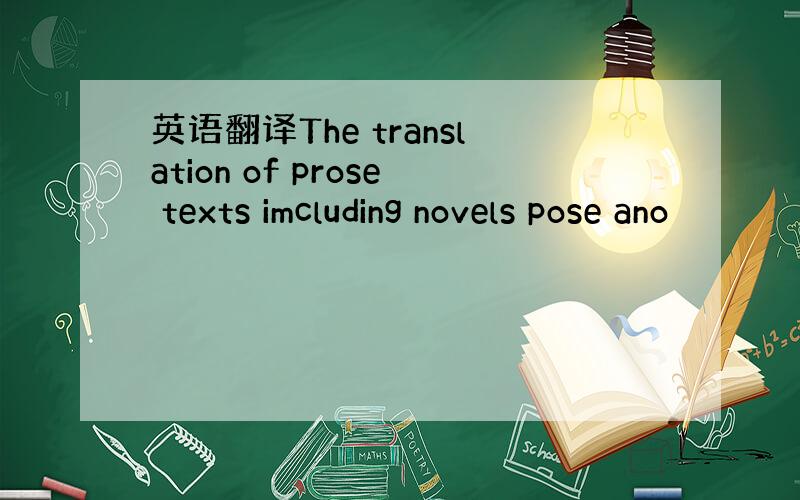英语翻译The translation of prose texts imcluding novels pose ano
来源:学生作业帮 编辑:搜狗做题网作业帮 分类:英语作业 时间:2024/05/02 00:00:23
英语翻译
The translation of prose texts imcluding novels pose another kind of problem.Hilaire Belloc outlined six general rules for the translator of prose texts:
(1),the translator should not ‘plod on’.word by word or sentence by sentence,but should always block out his work.By block out ,Belloc means that the translator should consider the work as an inegral unit and translate in sections,asking himself before each what the whole sense is he has to render.
(2) the translator should render idiom by idiom and idioms of their nature demand translation into another form from that of the oringinal.Bellc cites the case of the Greek exclamation ‘By the Dog!’,which,if renderred literally,becomes merely coming in English,and suggests that the phrase ‘By God!’is a much closer translation.Likewise,he points out that the French historic present must be translated into the English narrative tense,which is past,and the France system of defining a proposition by putting it into the form of a rhetorical question cannot be transposed into English where the same system does not apply.
(3) the translator must render intertion by intention,bearing in mind that the intention of a phrase in one language may be less emphatic.By intention,Belloc seems to be talking about the weight a given expression may have in a particular context in the SL that would be disproportionate if translated literally into the TL.He quotes several examples where the weighting of the phrase in the SL is clearly much stronger or much weaker than the literal TL translation,and points out that in the translation of intention,it is often necessary to add words not in the oringinal to conform to the idiom of one’s own tongue.
(4) belloc warns against le faux aims,those words or structures that may appear to correspond in the both SL and TL but actually do not,e.g.demander-to ask,translated wrongly as to demand.
(5) the translator is advised to transmute boldly and belloc suggestests that the essence of translating is the resurrection of an alien in a native body.
(6)the tranlator should never embellish
不要电脑翻译的。算了,自己译好了。有错之处,(1).译者不应逐字逐词地翻译,逐字逐句地翻译常会使译文支离破碎,贝洛克指出译者应当把作品做为一个整体,以段为单位进行翻译,在翻译之前,扪心自问,自己需传达怎样的整体意思。(2) 译者须把原文习语翻译成目标语习语,翻译本地习语需要把原文习语译成另一种形式,贝洛克以希腊的惊叹词“By the Dog”为例,如果逐字翻译,其英文意思将大相径庭,而习语“By God”则是更接近原文的译法。同样地,他指出法语的历史现在时应当翻译成英语的陈述式,而法语系统中用修辞疑问句的形式来加强语气,此手法并不适用于英文,因此无法转置成英文。(3)译者须译出原文的思想内涵,牢记另一语言的习语可能会削弱或增强原文的意图程度,贝洛克谈论的大意是如果把源语逐字翻译,则其在特定的语境下表达意思的程度将无法被适当体现,他举了几个在源语中短语的表达程度明显强于或弱于用逐字翻译译出的译语的例子,并指出在意译的过程中,为了符合本土语言习语,增加原文不存在的词语常常是必要的。(4) 贝洛克提醒避免“le faux aims” 那些词和结构可能看起来与源语和译语一致,但事实并非如此,例如
The translation of prose texts imcluding novels pose another kind of problem.Hilaire Belloc outlined six general rules for the translator of prose texts:
(1),the translator should not ‘plod on’.word by word or sentence by sentence,but should always block out his work.By block out ,Belloc means that the translator should consider the work as an inegral unit and translate in sections,asking himself before each what the whole sense is he has to render.
(2) the translator should render idiom by idiom and idioms of their nature demand translation into another form from that of the oringinal.Bellc cites the case of the Greek exclamation ‘By the Dog!’,which,if renderred literally,becomes merely coming in English,and suggests that the phrase ‘By God!’is a much closer translation.Likewise,he points out that the French historic present must be translated into the English narrative tense,which is past,and the France system of defining a proposition by putting it into the form of a rhetorical question cannot be transposed into English where the same system does not apply.
(3) the translator must render intertion by intention,bearing in mind that the intention of a phrase in one language may be less emphatic.By intention,Belloc seems to be talking about the weight a given expression may have in a particular context in the SL that would be disproportionate if translated literally into the TL.He quotes several examples where the weighting of the phrase in the SL is clearly much stronger or much weaker than the literal TL translation,and points out that in the translation of intention,it is often necessary to add words not in the oringinal to conform to the idiom of one’s own tongue.
(4) belloc warns against le faux aims,those words or structures that may appear to correspond in the both SL and TL but actually do not,e.g.demander-to ask,translated wrongly as to demand.
(5) the translator is advised to transmute boldly and belloc suggestests that the essence of translating is the resurrection of an alien in a native body.
(6)the tranlator should never embellish
不要电脑翻译的。算了,自己译好了。有错之处,(1).译者不应逐字逐词地翻译,逐字逐句地翻译常会使译文支离破碎,贝洛克指出译者应当把作品做为一个整体,以段为单位进行翻译,在翻译之前,扪心自问,自己需传达怎样的整体意思。(2) 译者须把原文习语翻译成目标语习语,翻译本地习语需要把原文习语译成另一种形式,贝洛克以希腊的惊叹词“By the Dog”为例,如果逐字翻译,其英文意思将大相径庭,而习语“By God”则是更接近原文的译法。同样地,他指出法语的历史现在时应当翻译成英语的陈述式,而法语系统中用修辞疑问句的形式来加强语气,此手法并不适用于英文,因此无法转置成英文。(3)译者须译出原文的思想内涵,牢记另一语言的习语可能会削弱或增强原文的意图程度,贝洛克谈论的大意是如果把源语逐字翻译,则其在特定的语境下表达意思的程度将无法被适当体现,他举了几个在源语中短语的表达程度明显强于或弱于用逐字翻译译出的译语的例子,并指出在意译的过程中,为了符合本土语言习语,增加原文不存在的词语常常是必要的。(4) 贝洛克提醒避免“le faux aims” 那些词和结构可能看起来与源语和译语一致,但事实并非如此,例如

Oh,my God.
英语翻译The translation of prose texts imcluding novels pose ano
英语翻译When historians began studying texts of the Middle Ages,
英语翻译the idea of a 'canon' of approved literary texts and aut
英语翻译Listen to the tape ,read the texts of Module 1 fluently
英语翻译The way which the different kinds of rock lie on one ano
英语翻译A Preliminary Study on the English Translation of Chines
英语翻译The Translation of Brand NamesAbstracts:China's entry in
英语翻译a) Supply a translation of the international application
the defination of the translation
英语翻译Convection is the transfer of heat from one place to ano
英语翻译1.The comfort and convenience of shopping centers is ano
英语翻译For the time being I have a point of sale in Tianjin,ano